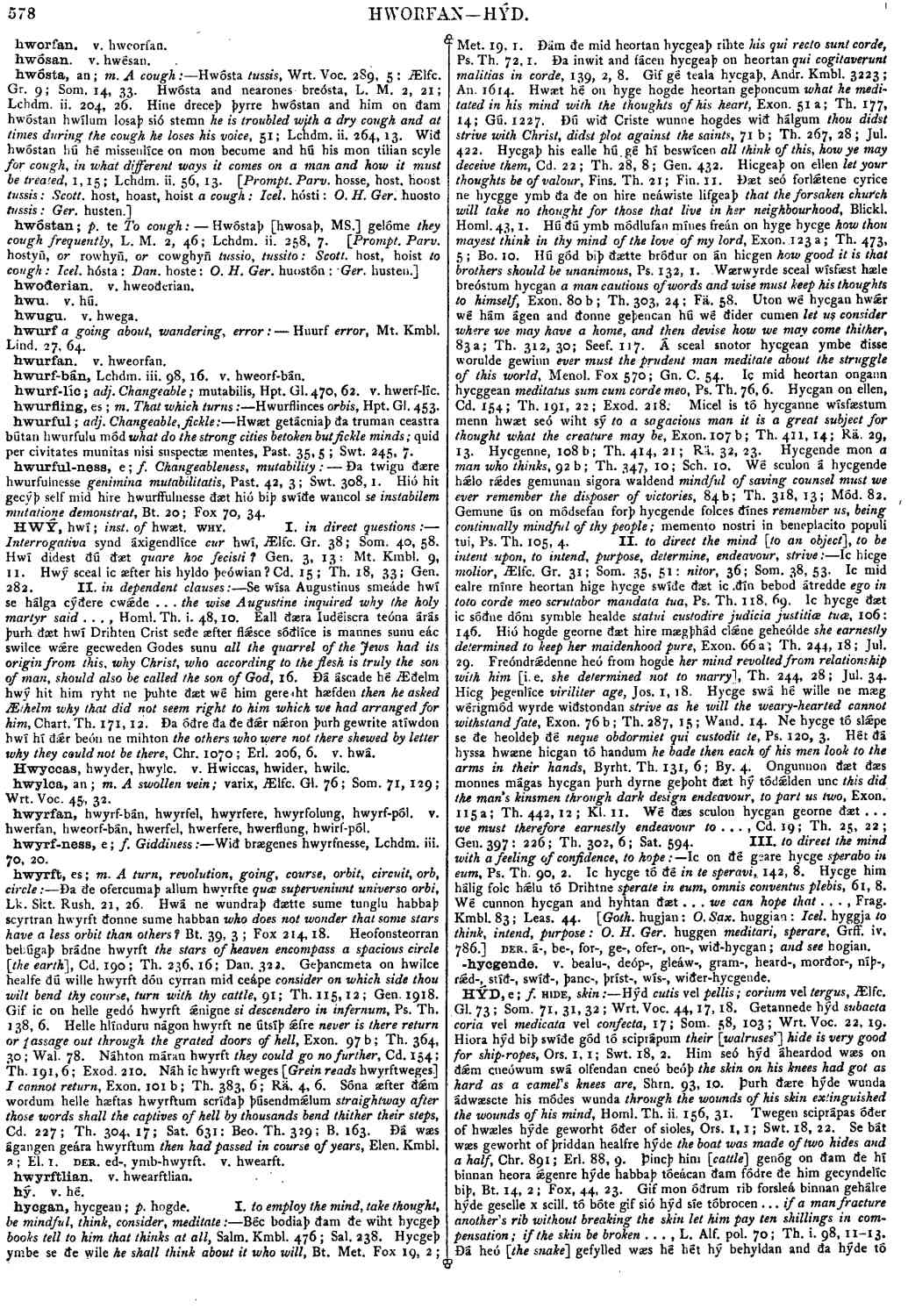HÝD
- noun [ feminine ]
-
Hýd
cutis vel pellis; corium vel tergus,
- Ælfc. Gl. 73 ;
- Som. 71, 31, 32 ;
- Wrt. Voc. 44, 17, 18.
-
Getannede hýd
subacta coria vel medicata vel confecta,
- 17 ;
- Som. 58, 103 ;
- Wrt. Voc. 22, 19.
-
Hiora hýd biþ swíde gód tó sciprǽpum
their [walruses'] hide is very good for ship-ropes,
- Ors. 1, 1 ;
- Swt. 18, 2.
-
Him seó hýd áheardod wæs on dǽm cneówum swá olfendan cneó beóþ
the skin on his knees had got as hard as a camel's knees are,
- Shrn. 93, 10.
-
Þurh ðære hýde wunda ádwæscte his módes wunda
through the wounds of his skin extinguished the wounds of his mind,
- Homl. Th. ii. 156, 31.
-
Twegen sciprápas óðer of hwæles hýde geworht óðer of sioles,
- Ors. 1, 1 ;
- Swt. 18, 22 .
-
Se bát wæs geworht of þriddan healfre hýde
the boat was made of two hides and a half,
- Chr. 891 ;
- Erl. 88, 9 .
-
Þincþ him [cattle] genóg on ðam ðe hí binnan heora ǽgenre hýde habbaþ tóeácan ðam fódre ðe him gecyndelíc biþ,
- Bt. 14, 2 ;
- Fox. 44, 23 .
-
Gif mon óðrum rib forsleá binnan gehálre hýde geselle x scill. tó bóte gif sió hýd síe tóbrocen ...
if a man fracture another's rib without breaking the skin let him pay ten shillings in compensation; if the skin be broken ...,
- L. Alf. pol. 70 ;
- Th. i. 98, 11-13.
-
Ðá heó [the snake] gefylled wæs hé hét hý behyldan and ða hýde tóRóme bringan ... heó wæs hundtwelftiges fóta lang,
- Ors. 4, 6 ;
- Bos. 85, 1 .
-
Hé healde iii niht hýde [of an ox] and heáfod and sceápes eallswá.
And gif hé ða hýde áweg sylle gilde xx óran,
- L. Eth. iii. 9 ;
- Th. i. 296, 118 .
-
Hwæt sind gescý búton deádra nýtena hýda?
- Homl. Th. ii. 280, 30.
-
Ic bicge hýda and fell
ego emo cutes et pelles,
- Coll. Monast. Th. 27, 29.
-
Horses hýda hí habbaþ him tó hrægle
pelliculas equorum ad vestimentum habentes,
- Nar. 38, 2.
- In the Laws the word is used in technical phrases relating to flogging [cf. colloquial 'to give one a hiding']
-
Wealh gafolgelda cxx scill. ... weales hýd twelfum
the 'wer' of a tenant of British race is one hundred and twenty shillings ... the 'hide-gild' of a man of British race is twelve shillings [the 'hide-gild' of a þeów (v. infra), whose wer was half that of a wealh, was six shillings; if the same proportion was kept, the weales hýd would be, as here, twelve shillings],
- L. In. 23 ;
- Th. i. 118, 4 .
-
Þeówman þolie his hýde oððe hýdgyldes
let a slave be flogged or pay the 'hide-gild,'
- L. E. G. 7, 8 ;
- Th. i. 172, 1, 7 :
- L. C. S. 45 ;
- 47 ;
- Th. i. 402, 16, 26.
-
Ðara hyrda ǽlc þolige ðære hýde,
- L. Edg. S. 9 ;
- Th. i. 276, 3.
-
Gif þeów deóflum geldaþ vi scill. gebéte oððe his hýd
if a slave offer to devils let him pay six shillings or be flogged,
- L. Wih. 13 :
- 15 :
- 10 ;
- Th. i. 40, S. 11 :
- 38, 22.
-
Gif hwá his hýde forwyrce and cirican geierne síe him sió swingelle forgifen
if any one be liable to flogging [lit. forfeit his hide] and escape into a church, let the scourging be forgiven him,
- L. In. 5 ;
- Th. i. 104, 15.
-
Se ðe ǽnig ðissa dó, gilde wíte, fríman xii ór, þeówman ða hýde,
- L. N. P. L. 56 ;
- Th. ii. 298, 25.
- v. Grm. R. A. 703 .
Bosworth, Joseph. “HÝD.” In An Anglo-Saxon Dictionary Online, edited by Thomas Northcote Toller, Christ Sean, and Ondřej Tichy. Prague: Faculty of Arts, Charles University, 2014. https://bosworthtoller.com/20237.
Checked: 1